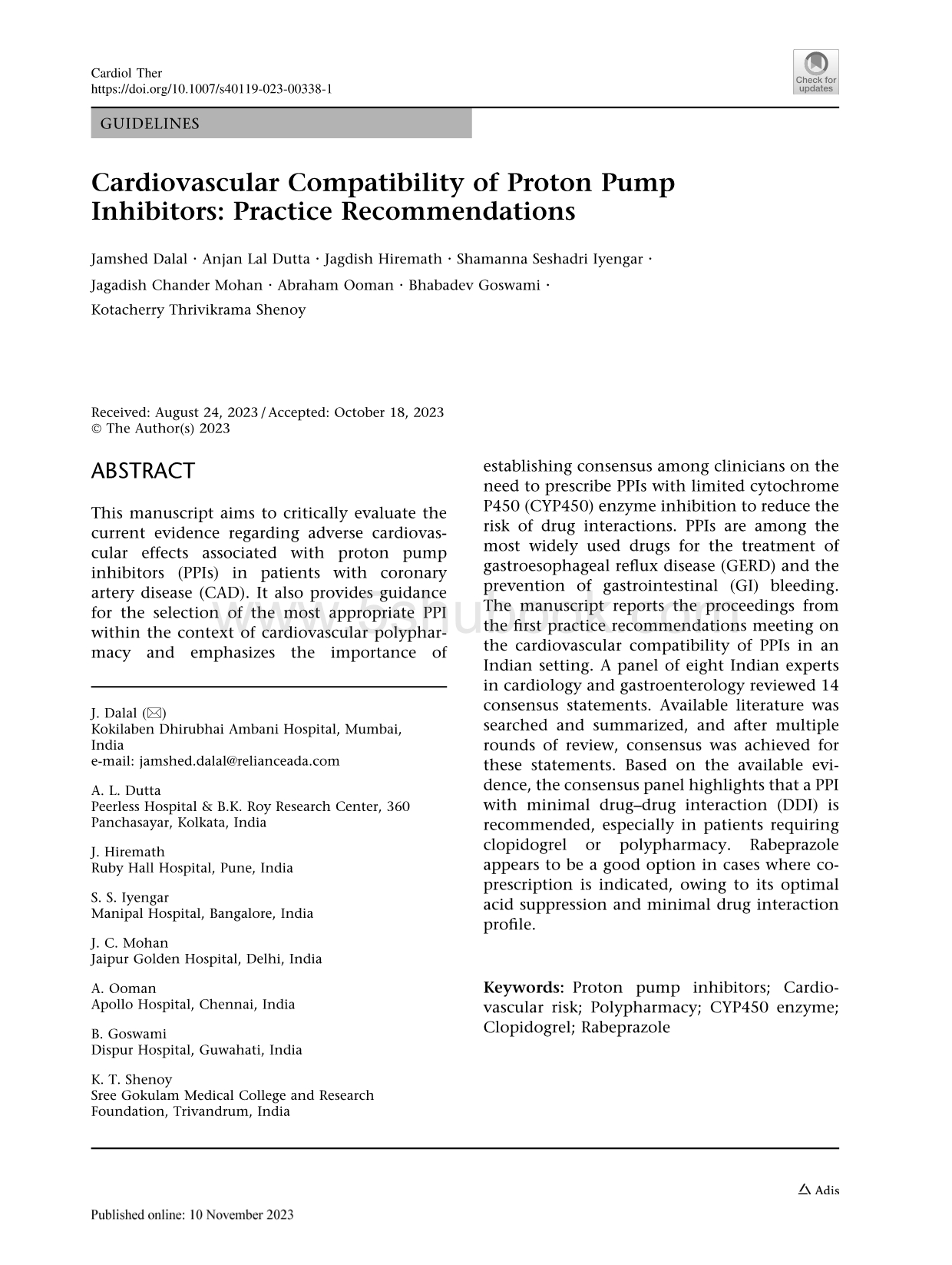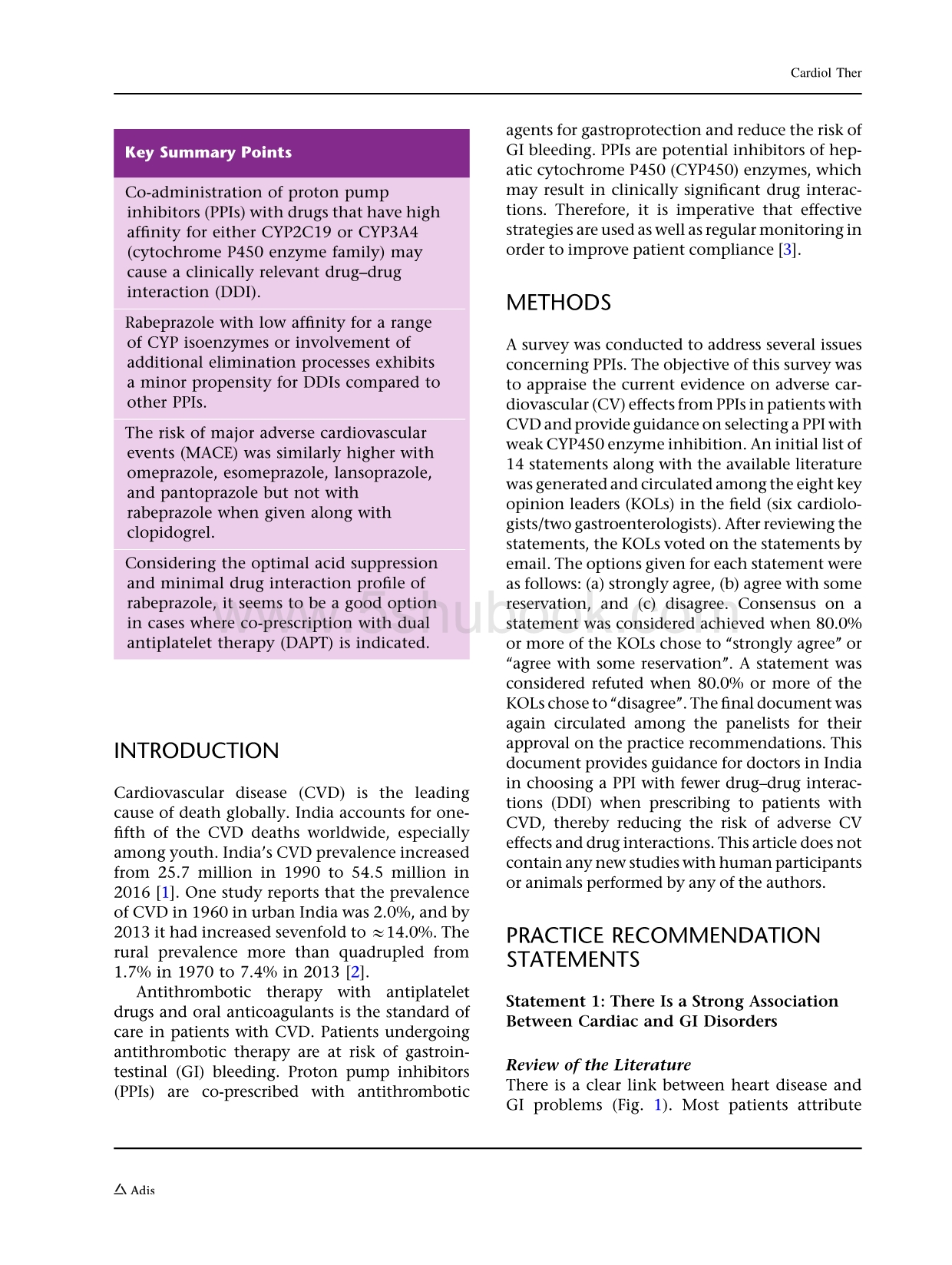
 2023+实践建议:质子泵抑制剂的心血管兼容性.(英文版)pdf
2023+实践建议:质子泵抑制剂的心血管兼容性.(英文版)pdf
《2023+实践建议:质子泵抑制剂的心血管兼容性.(英文版)pdf》由会员分享,可在线阅读,更多相关《2023+实践建议:质子泵抑制剂的心血管兼容性.(英文版)pdf(14页珍藏版)》请在周易易学书店|道易五术书社上搜索。
1、GUIDELINESCardiovascular Compatibility of Proton PumpInhibitors:Practice RecommendationsJamshed Dalal.Anjan Lal Dutta.Jagdish Hiremath.Shamanna Seshadri Iyengar.Jagadish Chander Mohan.Abraham Ooman.Bhabadev Goswami.Kotacherry Thrivikrama ShenoyReceived:August 24,2023/Accepted:October 18,2023 The Aut
2、hor(s)2023ABSTRACTThis manuscript aims to critically evaluate thecurrent evidence regarding adverse cardiovas-cular effects associated with proton pumpinhibitors(PPIs)in patients with coronaryartery disease(CAD).It also provides guidancefor the selection of the most appropriate PPIwithin the context
3、 of cardiovascular polyphar-macy and emphasizes the importance ofestablishing consensus among clinicians on theneed to prescribe PPIs with limited cytochromeP450(CYP450)enzyme inhibition to reducetherisk of drug interactions.PPIs are among themost widely used drugs for the treatment ofgastroesophage
4、al reux disease(GERD)and theprevention of gastrointestinal(GI)bleeding.The manuscript reports the proceedings fromthe rst practice recommendations meeting onthe cardiovascular compatibility of PPIs in anIndian setting.A panel of eight Indian expertsin cardiology and gastroenterology reviewed 14conse
5、nsus statements.Available literature wassearched and summarized,and after multiplerounds of review,consensus was achieved forthese statements.Based on the available evi-dence,theconsensuspanelhighlightsthataPPIwith minimal drugdrug interaction(DDI)isrecommended,especially in patients requiringclopid
6、ogrel or polypharmacy.Rabeprazoleappears to be a good option in cases where co-prescription is indicated,owing to its optimalacid suppression and minimal drug interactionprole.Keywords:Proton pump inhibitors;Cardio-vascular risk;Polypharmacy;CYP450 enzyme;Clopidogrel;RabeprazoleJ.Dalal(&)Kokilaben D
7、hirubhai Ambani Hospital,Mumbai,Indiae-mail:A.L.DuttaPeerless Hospital&B.K.Roy Research Center,360Panchasayar,Kolkata,IndiaJ.HiremathRuby Hall Hospital,Pune,IndiaS.S.IyengarManipal Hospital,Bangalore,IndiaJ.C.MohanJaipur Golden Hospital,Delhi,IndiaA.OomanApollo Hospital,Chennai,IndiaB.GoswamiDispur
8、Hospital,Guwahati,IndiaK.T.ShenoySree Gokulam Medical College and ResearchFoundation,Trivandrum,IndiaCardiol Therhttps:/doi.org/10.1007/s40119-023-00338-1Key Summary PointsCo-administration of proton pumpinhibitors(PPIs)withdrugsthathavehighafnity for either CYP2C19 or CYP3A4(cytochrome P450 enzyme
9、family)maycause a clinically relevant drugdruginteraction(DDI).Rabeprazole with low afnity for a rangeof CYP isoenzymes or involvement ofadditional elimination processes exhibitsa minor propensity for DDIs compared toother PPIs.The risk of major adverse cardiovascularevents(MACE)was similarly higher
10、 withomeprazole,esomeprazole,lansoprazole,and pantoprazole but not withrabeprazole when given along withclopidogrel.Considering the optimal acid suppressionand minimal drug interaction prole ofrabeprazole,it seems to be a good optionin cases where co-prescription with dualantiplatelet therapy(DAPT)i
11、s indicated.INTRODUCTIONCardiovascular disease(CVD)is the leadingcause of death globally.India accounts for one-fth of the CVD deaths worldwide,especiallyamongyouth.IndiasCVDprevalenceincreasedfrom 25.7 million in 1990 to 54.5 million in2016 1.One study reports that the prevalenceofCVDin1960inurbanI
12、ndiawas2.0%,andby2013ithadincreasedsevenfoldto&14.0%.Therural prevalence more than quadrupled from1.7%in 1970 to 7.4%in 2013 2.Antithrombotic therapy with antiplateletdrugs and oral anticoagulants is the standard ofcare in patients with CVD.Patients undergoingantithrombotic therapy are at risk of ga
13、stroin-testinal(GI)bleeding.Proton pump inhibitors(PPIs)are co-prescribed with antithromboticagentsforgastroprotectionandreducetheriskofGI bleeding.PPIs are potential inhibitors of hep-atic cytochrome P450(CYP450)enzymes,whichmay result in clinically signicant drug interac-tions.Therefore,it is impe
14、rative that effectivestrategiesareusedaswellasregularmonitoringinordertoimprovepatientcompliance3.METHODSA survey was conducted to address several issuesconcerningPPIs.Theobjectiveofthissurveywasto appraise the current evidence on adverse car-diovascular(CV)effectsfromPPIsinpatientswithCVDandprovide
15、guidanceonselectingaPPIwithweakCYP450enzymeinhibition.Aninitiallistof14 statements along with the available literaturewasgeneratedandcirculatedamongtheeightkeyopinion leaders(KOLs)in the eld(six cardiolo-gists/twogastroenterologists).Afterreviewingthestatements,theKOLsvotedonthestatementsbyemail.The
16、optionsgivenforeachstatementwereasfollows:(a)stronglyagree,(b)agreewithsomereservation,and(c)disagree.Consensus on astatement was considered achieved when 80.0%or more of the KOLs chose to strongly agree oragree with some reservation.A statement wasconsidered refuted when 80.0%or more of theKOLschos
17、etodisagree.Thenaldocumentwasagain circulated among the panelists for theirapproval onthe practice recommendations.ThisdocumentprovidesguidancefordoctorsinIndiain choosing a PPI with fewer drugdrug interac-tions(DDI)when prescribing to patients withCVD,thereby reducing the risk of adverse CVeffectsa
18、nddruginteractions.Thisarticledoesnotcontainanynewstudieswithhumanparticipantsoranimalsperformedbyanyoftheauthors.PRACTICE RECOMMENDATIONSTATEMENTSStatement 1:There Is a Strong AssociationBetween Cardiac and GI DisordersReview of the LiteratureThere is a clear link between heart disease andGI proble
19、ms(Fig.1).Most patients attributeCardiol Thertheir coronary artery disease(CAD)symptomsto gas and acidity,which results in delayeddiagnosis and poor outcomes of CAD.Gastroesophageal reux disease(GERD)isassociated not only with non-cardiac chest painepisodes,but also with increased incidence ofischem
20、ic events in patients with CVD andrefractory chest pain 4.In patients with CADundergoing percutaneous coronary interven-tion(PCI),antithrombotic therapy is used tominimize the risk of stent thrombosis andrecurrent CV events 5.Antithrombotic ther-apy is associated with high risk of GI bleeding.Increa
21、sed GI bleeding is associated with anincreased risk of CV events and mortality,andprolonged hospitalization 6.Polypharmacywith drugs used to manage CVD can causeupper GI symptoms.Some drugs used to treatupper GI symptoms may increase CVD riskeither directly or through drugdrug interac-tions.Therefor
22、e,recognizing patients with bothCVD and upper GI conditions is an importantstepintheclinicalcaresetting7.PPIuseforanextended period of time may suppressdimethylarginine dimethylaminohydrolase(DDAH)activity.This leads to increased asym-metrical dimethyl arginine(ADMA)levelswhich inhibit nitric oxide(
23、NO)synthesis andincrease the risk of CVD 8.Statement 2:Increased GI BleedingIncreases CV Events,Mortality,and Prolonged HospitalizationReview of the LiteratureAcute myocardial infarction(AMI),percuta-neous coronary intervention(PCI),and antico-agulant or antiplatelet drugs are all known tocause GI b
24、leeding in patients admitted to thecardiology department 9.Not only does thiscause prolonged hospitalization but alsoincreases the risk of CV events and mortality(Fig.2)10.Post-procedural bleeding episodeswere linked to an elevated risk of in-hospitalmortalityinalargeregistryofPCIpatients,withan est
25、imated 12.1%of fatalities due to bleedingcomplications11.GIbleedingisacatastrophiccondition in the setting of acute coronary syn-drome(ACS).It is associated with increasedrates of mortality,nonfatal MI,stent thrombo-sis,andprolongedhospitalization.Thedurationof hospitalization is twice as long in pa



- 配套讲稿:
如PPT文件的首页显示word图标,表示该PPT已包含配套word讲稿。双击word图标可打开word文档。
- 特殊限制:
部分文档作品中含有的国旗、国徽等图片,仅作为作品整体效果示例展示,禁止商用。设计者仅对作品中独创性部分享有著作权。
- 关 键 词:
- 实践 建议 质子 抑制剂 心血管 兼容性
 周易易学书店|道易五术书社所有资源均是用户自行上传分享,仅供网友学习交流,未经上传用户书面授权,请勿作他用。
周易易学书店|道易五术书社所有资源均是用户自行上传分享,仅供网友学习交流,未经上传用户书面授权,请勿作他用。









 《风湿病中医特色治疗》·吴启富.pdf(342页)
《风湿病中医特色治疗》·吴启富.pdf(342页)
 【2016爱爱医中医擂台赛】:协定处方院内验方 院内制剂汇集(骨伤科类)天津市中医院.doc(2页)
【2016爱爱医中医擂台赛】:协定处方院内验方 院内制剂汇集(骨伤科类)天津市中医院.doc(2页)
 穴位贴敷疗法(中医特色治疗).ppt(14页)
穴位贴敷疗法(中医特色治疗).ppt(14页)
